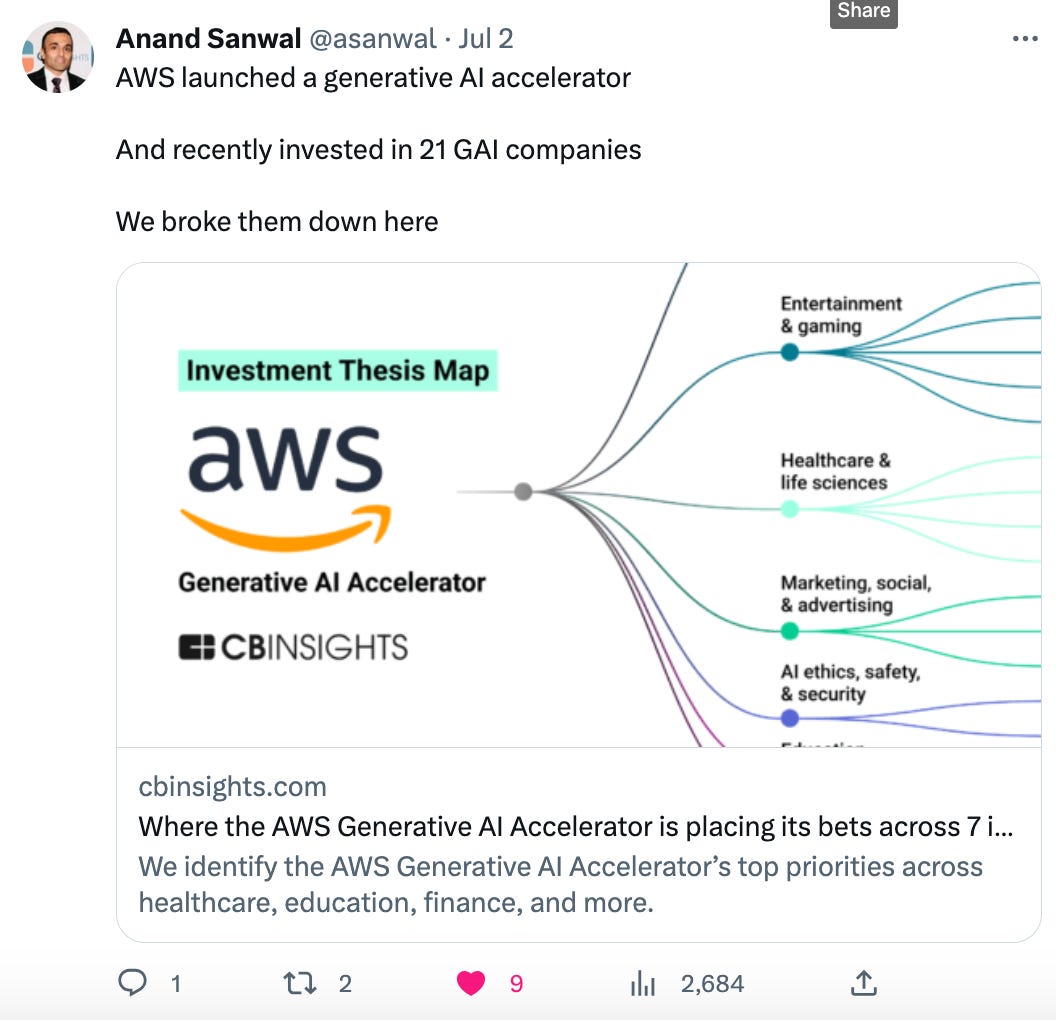Moneyball is a fortnightly newsletter from Koble exploring the limitations of human decision-making and their implications for startup investing.
We’ve spent two years developing our groundbreaking algorithms, which discover early-stage startups that outperform the market and predict their probability of success.
Koble update
Our algorithms are performing at a 58% success hit-rate (i.e. startups that Koble recommends for investment being a success).
For context, we’re 3x better than the VC industry median of 19%, and YC is 33%. Today Koble would outperform 95% of traditional human-led funds.
Plenty of work to do still – next up, Benchmark and Kleiner Perkins at 63%.
We won’t stop until we’re officially superhuman.
This week
🧠 Mental Model #19 – The Paradox of Choice – Why more is less in investing
📖 Investor reading – “There is this sort of anti-AI movement underway” – To Build AI technology, startups turn to bigger rivals for help – Going public is not a viable option for many VC-backed startups
💬 Some tweets – AWS launched a generative AI accelerator – The problems of modernity – A massive red flag
Why more is less in investing
Choice is good. But too much choice is bad.
We are culturally programmed to assume that choice is a good thing; that more is more. But what if choice were a bad thing, and more was actually less?
What if choice was responsible for Venture’s Capital’s infamous failure rates? A wolf (or adorable kitten) in sheep’s clothing, destroying returns for founders, investors, and society…
At the heart of VC lies a paradox; GPs require access to large volumes of proprietary deal flow, but the almost endless choice of startups results in poor decision-making and negative economic outcomes.
“The Paradox of Choice” is a phrase coined by eminent psychologist Barry Schwartz. It alludes to a serious bug in the human operating system. As the number of options available to us increases, we experience difficulties in making decisions.
Schwartz’s research highlights how excess of options leads to decision fatigue. In his book, he recounts a study conducted by Sheena Iyengar and Mark Lepper from Columbia and Stanford University. On a regular day at a local food market, people were presented with a display table offering 24 different kinds of jams. On another day, people were given only 6 different types of jam choices.
The study found that just 6 jam options would be more likely to result in a purchase than a choice of 24 or 30 jams. Schwartz concludes that:
“The fact that some choice is good doesn’t necessarily mean that more choice is better.”
People experience the same counterproductive effect when browsing dating sites, streaming platforms, restaurant menus… any context in which choice is perceived as a driver of engagement and monetisation, rather than an inhibitor.
The read across to startup investing is obvious. An abundance of choice makes angels less likely to deploy capital into startups. And for VCs, it creates inefficiencies that erode returns over the long run.
Filtering the deluge of startups seeking funding demands substantial time, effort, and money from VCs. The challenge of distinguishing between startups with similar value propositions is real, creating inertia and its ugly cousin, FOMO.
We’re talking about serious behavioural distortions – playing it safe with me-too investments, or charging into deals without sufficient diligence. Seen in this light, too much choice is a drag on returns, and indeed innovation at a societal level.
And there is another, often underestimated byproduct of too much choice – dissatisfaction with our decisions.
Investors are human (at least, for the time being). We have to live with our decisions on a daily, even hourly basis. An overabundance of choice in public markets can erode our mental wellbeing, leading to excessive trading (and transaction costs), and a tendency to “time the market” rather than profit from “time in the market”.
This is not such a problem in the illiquid arena of Venture Capital, where decisions are also anti-decisions – commitments to refrain from making other investments for long periods. But opportunity costs of committing capital across long cycles are real, and the careers of the best VCs are littered with missed investments. “The one that got away” hurts even more than the ones that fail.
Implications for investors
Choice is good. Too much choice is bad.
AI offers an antidote, since it is perfectly suited to helping humans manage overabundance. For VCs, the use cases are plentiful and well documented:
Deal flow filtering – analyse large datasets of startups, identifying patterns, trends, and KPIs and allowing fund managers to filter and prioritise investment opportunities.
Due diligence – conduct due diligence on startups by analysing vast amounts of unstructured data, such as news articles, social media posts, industry reports, and financial statements.
Predictive analytics – leverage data to develop predictive models that estimate the success or failure of startups.
Portfolio Management – manage portfolios more effectively by continuously monitoring and optimising the performance of existing investments.
Domain expertise – provide contextualised insights at the company and industry level, simulating and scaling the expertise of practitioners.
Taken as a whole, these are significant upgrades to the status quo. Time will tell, but they have the potential to do more than simply disrupt old school venture capital methodologies; they can change the economic profile of VC as an asset class, creating better risk-adjusted returns for investors in startups.
Mae West said, “Too much of a good thing can be wonderful.” She was wrong, at least, when it comes to investing. Too much of a good thing can be terrible. Better to listen to Einstein, who believed that:
“Everything should be made as simple as possible, but not simpler.”
Economic history teaches us that the world’s greatest value creators (Ford, Kroc, Jobs etc) are simplifiers – they approach business subtractively, not additively. That is the task of investors, mathematicians, and technologists as we enter a bold new phase in Venture Capital’s journey.
More is not more. More is less. And less is more.
Work with Koble
At Koble, we’ve spent two years developing our groundbreaking algorithms, which discover early-stage startups that outperform the market and predict their probability of success.
We’re working with forward-thinking angels, VCs, family offices, and hedge funds to re-engineer startup investing with AI. If that resonates, get in touch.
Investor reading
🤖 “There is this sort of anti-AI movement underway” – An interview with a16z’s Marc Andreessen about AI and how you change the world.
💵 To build AI technology, startups turn to bigger rivals for help – The huge amounts of money and computing power needed for startups trying to make a go of it with today’s hottest AI technology are making garage start-up tales a thing of the past.
💀 Going public is not a viable option for many VC-backed startups – The dead IPO market is dragging down VCs’ ability to raise new funds with returns tied up in startups overdue an exit.
Some tweets
Parting shot
“It is our choices, Harry, that show what we truly are, far more than our abilities.”
― J.K. Rowling, Harry Potter and the Chamber of Secrets
Regards from your [simple] startup investing AI,
About Koble
Koble is re-engineering startup investing with AI, applying quantitative strategies that have disrupted public markets to early-stage startup investing.







